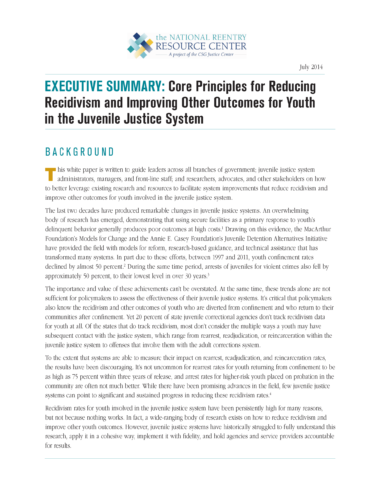Core Principles for Reducing Recidivism and Improving Other Outcomes for Youth in the Juvenile Justice System
This white paper was written to guide leaders across all branches of government; juvenile justice system administrators, managers, and front-line staff; and researchers, advocates, and other stakeholders on how to better leverage existing research and resources to facilitate system improvements that reduce recidivism and improve other outcomes for youth involved in the juvenile justice system.
The focus of the white paper is to promote what works to support successful reentry for youth who are under juvenile justice system supervision. To help advance this goal, this white paper does the following:
- Part One distills and synthesizes the research on what works to reduce recidivism and improve outcomes for youth in the juvenile justice system into four core principles. The discussion of each principle includes the latest research supporting the importance of the principle accompanied by specific policy, practice, and resource-allocation recommendations, which when taken together, offers the potential for significant recidivism reductions and improvements in other youth outcomes. It also provides examples illustrating how state and local juvenile justice officials have established particular policies and system interventions to implement these principles.
- Recognizing that improved outcomes are possible only when research on what works is implemented with fidelity, Part Two details lessons learned from research and practice on how to implement the principles effectively, and provides examples of how state and local juvenile justice systems have operationalized the principles in practice.
In response to growing calls for police reform in New Jersey, particularly following the shootings of Najee Seabrooks…
Read More Three Things to Know About New Jersey’s Groundbreaking Community Response Legislation
Three Things to Know About New Jersey’s Groundbreaking Community Response Legislation
In response to growing calls for police reform in New Jersey, particularly following the shootings of Najee Seabrooks and Andrew Washington in March and August 2023, a coalition of law enforcement officials, mental health professionals, and community advocates partnered to explore public safety response alternatives.
Read More Apply Now: Join a Learning Community for Community and Crisis Response Teams to Improve Responses to Youth
Read More
Apply Now: Join a Learning Community for Community and Crisis Response Teams to Improve Responses to Youth
Read More
 Apply Now: Join a Learning Community Focused on Substance Use and Overdose Community Response Programs
Read More
Apply Now: Join a Learning Community Focused on Substance Use and Overdose Community Response Programs
Read More















